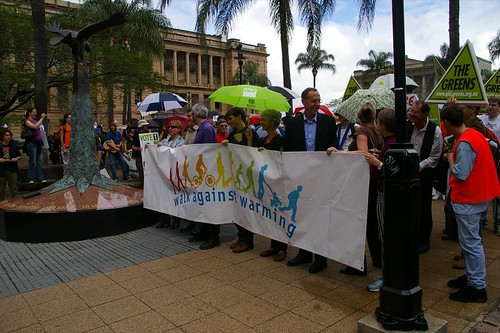February 2, 2007
From Union of Concerned Scientists.
Authoritative Report Confirms Human Activity Driving Global Warming
Strongest evidence yet that human activity is causing warming in atmosphere, land, and oceans.
WASHINGTON—After six years of assessing climate science research from around the world, the United Nation's Intergovernmental Panel on Climate Change (IPCC) has solidified the scientific understanding that key heat-trapping gases in the atmosphere "have increased markedly as a result of human activities," and the "net effect of human activities since 1750 has been one of warming." The report states that evidence of the climate's warming "is unequivocal, as is now evident from observations of increases in global average air and ocean temperatures, widespread melting of snow and ice, and rising global mean sea level."
"This report reaffirms that our emissions are the primary cause of global warming," said Peter Frumhoff, Director of Science and Policy at UCS. "The good news is that by taking action today to dramatically reduce our emissions, we can avoid much of the warming projected in this report."
The new IPCC Working Group I Summary for Policymakers synthesizes the current understanding of climate change and projects future climate change using the most comprehensive set of well-established global climate models. The report is the first of three major studies that comprise the IPCC Fourth Assessment, with input from more than 1,200 authors and 2,500 scientific expert reviewers from more than 130 countries. Subsequent reports will evaluate global warming consequences and options for reducing future warming.
The report confirms that the current level of carbon dioxide, a critical heat-trapping gas in the atmosphere, "exceeds by far the natural range over the last 650,000 years." Since the dawn of the industrial era, carbon dioxide and other key heat-trapping gases have increased at a rate that is "very likely to have been unprecedented in more than 10,000 years."
This unprecedented increase has led to warming of the atmosphere, land, and ocean:
- Eleven of the last twelve years rank among the twelve hottest years on record.
- "The maximum area covered by seasonally frozen ground has decreased by about 7 percent in the Northern Hemisphere since 1900, with a decrease in spring of up to 15 percent."
- "More intense and longer droughts have been observed over wider areas since the 1970s, particularly in the tropics and subtropics." Droughts have been linked to changes in sea surface temperatures and wind patterns and decreased snowpack and snow cover.
"This evidence is a wake up call and we need to stop hitting the snooze button," said UCS climate scientist Brenda Ekwurzel. "Will we take sufficient action to avoid the worst effects of global warming or resign ourselves to the consequences of a very different climate?"
Even if we act today to reduce our emissions from cars, power plants, and other sources, past emissions will commit us to more warming since they stay in the atmosphere for decades. The report concludes that if we take no action to reduce emissions, there will be twice as much warming over the next two decades than if we had stabilized heat-trapping gases at 2000 levels. Among other changes, the models also:
- Find it is likely that future tropical cyclones (typhoons and hurricanes) will become more intense, with higher peak wind speeds and more heavy precipitation associated with warmer tropical seas.
- Suggest that if global average temperatures were to exceed 1.9 to 4.6 degrees C (3.4 to 8.3 degrees F) compared to pre-industrial temperatures, the Greenland ice sheet would lose mass faster than it gains, producing a net contribution to sea level rise. If sustained, the loss of ice would eventually lead to complete elimination of the Greenland ice sheet and contribute an additional 23 feet to sea level rise.
- Project a greater than 90 percent likelihood that hot extremes, heat waves, and heavy precipitation events will continue to become more frequent.
"What we've observed and what we expect to see make it critical that we meaningfully reduce our emissions," said Ekwurzel. "We can still avoid catastrophic climate change, but only if we start today."
Read the article.





No comments:
Post a Comment